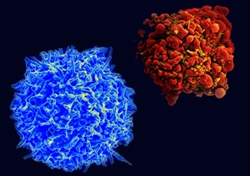
Using Gene Editing to Delete HIV From Human T Cells
Curing diseases like HIV/AIDS is not a direct application of agricultural biotechnology, but could have a direct impact on …


El inglés es el idioma de control de esta página. En la medida en que haya algún conflicto entre la traducción al inglés y la traducción, el inglés prevalece.
Al hacer clic en el enlace de traducción se activa un servicio de traducción gratuito para convertir la página al español. Al igual que con cualquier traducción por Internet, la conversión no es sensible al contexto y puede que no traduzca el texto en su significado original. NC State Extension no garantiza la exactitud del texto traducido. Por favor, tenga en cuenta que algunas aplicaciones y/o servicios pueden no funcionar como se espera cuando se traducen.
Inglês é o idioma de controle desta página. Na medida que haja algum conflito entre o texto original em Inglês e a tradução, o Inglês prevalece.
Ao clicar no link de tradução, um serviço gratuito de tradução será ativado para converter a página para o Português. Como em qualquer tradução pela internet, a conversão não é sensivel ao contexto e pode não ocorrer a tradução para o significado orginal. O serviço de Extensão da Carolina do Norte (NC State Extension) não garante a exatidão do texto traduzido. Por favor, observe que algumas funções ou serviços podem não funcionar como esperado após a tradução.
English is the controlling language of this page. To the extent there is any conflict between the English text and the translation, English controls.
Clicking on the translation link activates a free translation service to convert the page to Spanish. As with any Internet translation, the conversion is not context-sensitive and may not translate the text to its original meaning. NC State Extension does not guarantee the accuracy of the translated text. Please note that some applications and/or services may not function as expected when translated.
Collapse ▲
Curing diseases like HIV/AIDS is not a direct application of agricultural biotechnology, but could have a direct impact on …
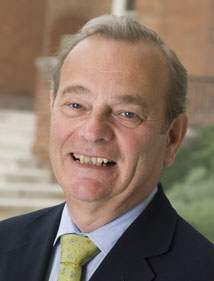
Agricultural ecologist Sir Gordon Conway speaks about agricultural biotechnology in Africa. Sir Conway is a professor of International Development …

A fungus that causes the disease chalara has wiped out 90% of the ash trees in Denmark is now …
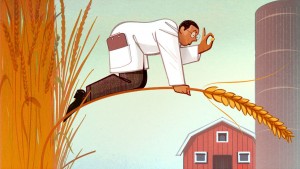
CRISPR is a powerful and precise new technology that can be used to edit genes. The technology can be …
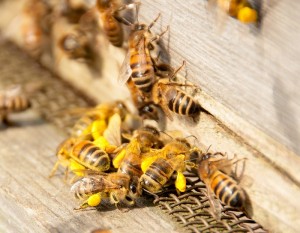
Canadian science are planning to use biotechnology to develop honey bees that are resistant to pest and diseases and …
The International Technology Innovation Foundation released a report that claims that barriers to the adoption of agricultural biotechnology innovation …
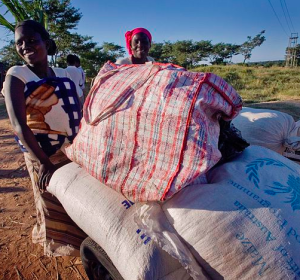
The government of Zimbabwe rejected food aid containing genetically engineered crops during the famine caused by drought in 2003. …

March 9, 2016 by Mick Kulikowski Rodolphe Barrangou, an NC State professor and pioneer of the discovery of the adaptive bacterial …

Sara Reardon discusses some of the current applications of gene editing in animals using CRIPSR in this article in …

Researchers from the University of Florida have genetically engineered citrus to have higher levels of anthrocyanins. Anthocyanins are thought …
February 29, 2016 WEST LAFAYETTE, Ind. – Higher food prices, a significant boost in greenhouse gas emissions due to land …
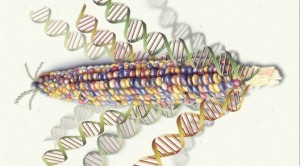
One of the most common questions I am asked is “what is a genetically modified food? People are often …
The Bangladesh Agricultural Research Institute is planning to apply for the approval for releasing one variety of potato that …

Public breeders at the Central Institute of Cotton Research in Nagpur, India have introduced Bt genes into 21 cotton …
Purdue president Mitch Daniels was the keynote speaker at the annual Agricultural Outlook Forum on Thursday, February 25. Daniels …

Texas A&M scientists are making progress finding where key traits are in the wheat genome and how to access …
Published on 22 February 2016 Researchers have made an advance in the fight against a deadly virus that affects pigs. The …
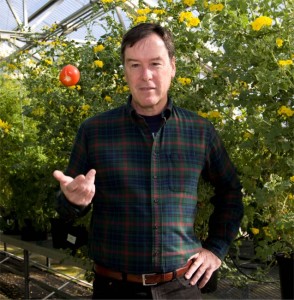
Dr. Kevin Folta interviews Dr. Harry Klee, a molecular biologist at the University of Florida. The interview with Dr. …

This article discusses the apparent disconnect between the essentially pro-technology position of the government and scientist and the reluctance …

This is an interesting article about feeding the growing population or the world by Professor Tim Benton of Leeds …